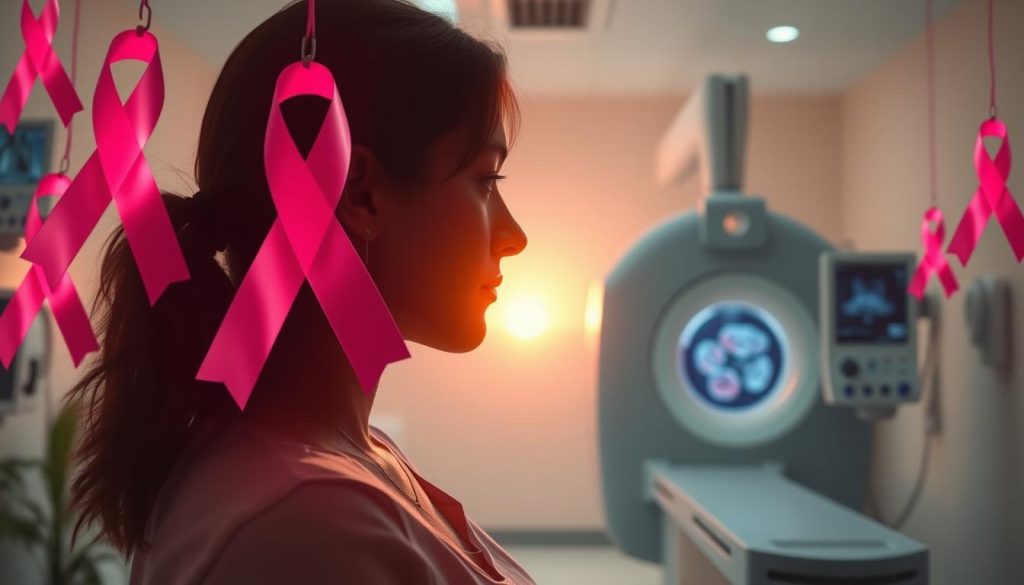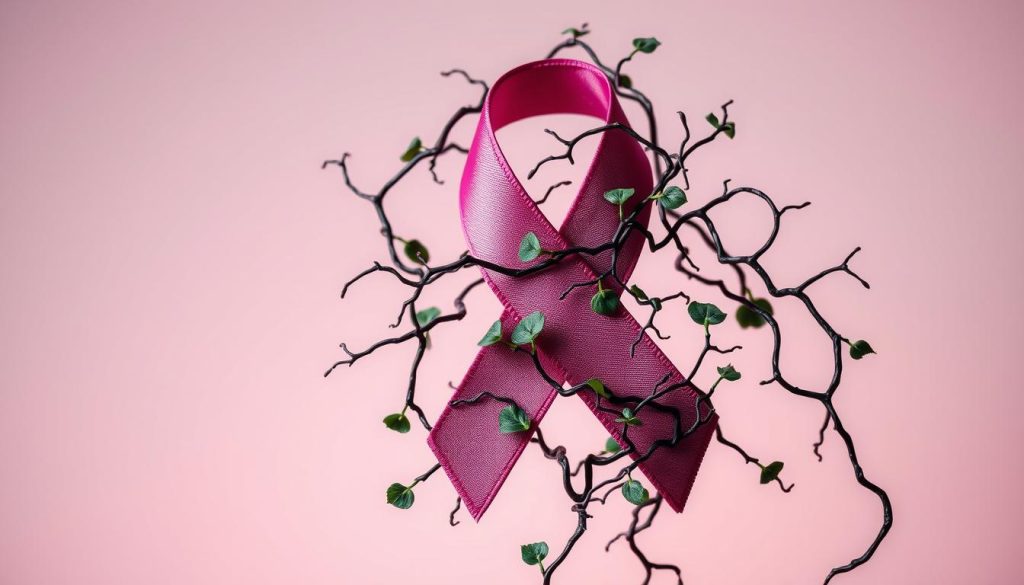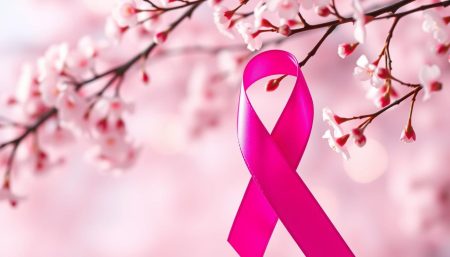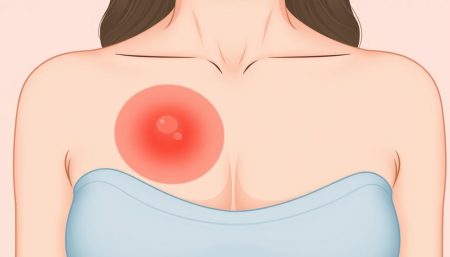The journey through breast cancer is complex. It’s defined by the stages of breast cancer. Knowing the breast cancer progression is key for patients and their families. It helps guide treatment options and can affect the outcome.
This knowledge helps make informed decisions. It’s crucial from the first diagnosis to the risk of breast cancer metastasis. We’ll explore what makes each stage unique and why it’s so important.
Key Takeaways
- Understanding the stages of breast cancer gives patients vital information for their health journey.
- Each stage has unique characteristics that influence treatment approaches and patient outcomes.
- Detailed knowledge of breast cancer progression encourages proactive participation in care and potential recovery.
- Understanding the risk of breast cancer metastasis underscores the importance of vigilant monitoring and timely treatment.
- The classification of breast cancer into stages serves as a guideline for clinicians to devise the most effective treatment plans.
Understanding Breast Cancer: An Overview
Breast cancer is a complex disease with different forms. Each form needs a unique approach for diagnosis and treatment. The journey from finding a lump to getting a breast cancer diagnosis has many stages of breast cancer. Knowing about breast cancer development and finding it early is key to managing it well.
Breast cancer starts when cells in the breast grow out of control. These cells form a tumor that can be seen on an x-ray or felt as a lump. So, understanding the stages of breast cancer and the breast cancer diagnosis stages is important for choosing the right treatment.
- Non-Invasive Breast Cancer: Often found in early screening stages.
- Invasive Breast Cancer: Where cells have spread to surrounding tissues.
- Metastatic Breast Cancer: Advanced breast cancer where cancer has spread beyond the primary site.
Each type of breast cancer development is different and needs special tests. From mammograms to biopsies and molecular testing, finding a definitive diagnosis involves important steps for each patient.
Knowing the stages of breast cancer helps plan treatment and empowers patients and their families. Early detection and understanding the breast cancer diagnosis stages can greatly improve chances of survival.
Breast cancer development is a complex process influenced by genetics, environment, and lifestyle. The medical community is working hard to find better diagnostic tools and treatments.
The main goal is to catch breast cancer early, ideally before it spreads. This highlights the importance of regular screenings and being aware of any health changes. So, talking about the stages of breast cancer is not just about medical knowledge. It’s also about being proactive about health.
Early Detection: The Key to Managing Breast Cancer
Early detection is key in managing breast cancer. It helps stop the cancer from getting worse and makes treatments more effective. This can lead to better survival rates. It’s important to get regular screenings and know the first signs of the disease.
Importance of Regular Screenings
Regular screenings are a big part of early detection. Doctors say routine mammograms and other tests are crucial. They help find breast cancer early, when it’s easier to treat.
“Early detection through regular screenings can significantly increase the chances of successful treatment and recovery” – Leading Cancer Prevention Organization.
Screenings should match your age and risk level. This makes your screening plan unique to you.
Recognizing Early Symptoms
Knowing the early signs of breast cancer is also key. Look out for new lumps, changes in breast shape, and other physical signs. If you notice these, see a doctor right away. This can lead to early treatment and diagnosis.
- Lump or mass in the breast or underarm area
- Changes in the size or shape of the breast
- Unusual discharge from the nipple
- Swelling or skin changes such as redness or dimpling
It’s good to be aware of your body and get professional screenings. This can greatly improve your chances of early detection.

Stages of Breast Cancer: A Detailed Breakdown
The journey through breast cancer stages is complex. Each stage has its own traits and treatment options. Knowing how the disease progresses helps in managing it better.
Stage 0 (Zero): Non-Invasive Breast Cancer
Stage 0, or ductal carcinoma in situ (DCIS), is a non-invasive form. It’s when abnormal cells are found in a breast milk duct. But these cells haven’t spread to other breast tissue yet. Catching it early is key for successful treatment.
Stage I: Early Stage Invasive Breast Cancer
In Stage I, the cancer is invasive but small. It’s still in the area where it started. This stage is split into IA and IB based on tumor size and lymph node involvement.
Stage II: Early Stage Continued
Stage II sees the cancer growing but not spreading to distant organs. It’s divided into IIA and IIB based on tumor size and lymph nodes. Even though it’s more serious, there are many treatments to control and often cure it.
It’s crucial to understand these early stages of breast cancer. Both patients and doctors need to tailor the best treatment plans. Each step, from non-invasive to more advanced, requires careful decisions about treatment. Early detection and comprehensive care are vital.
Stage III Breast Cancer: Understanding Locally Advanced Disease
Stage III breast cancer is a serious condition known as locally advanced disease. It involves large tumors and lymph node involvement. Knowing this is key for effective treatment.
This section explores tumor size, lymph node involvement, and treatment options. These factors shape the treatment plan for Stage III patients.

Tumor Size and Lymph Node Involvement in Stage III
Stage III breast cancer is a critical stage. The cancer has spread beyond the breast. Lymph nodes in the armpit or near the breastbone are also affected.
The stage is further divided based on lymph node involvement and tumor size. This helps doctors plan the best treatment.
- The tumor may be over five centimeters and has spread to the chest wall or breast skin. This causes swelling or an ulcer.
- Cancer cells have spread to up to nine lymph nodes in the armpit or near the breastbone. This makes the situation more complex.
Knowing these details helps doctors choose the most aggressive treatment plan.
Treatment Options for Stage III
Treatment for Stage III breast cancer includes various therapies. These aim to reduce tumor size, manage symptoms, and slow disease progression. Available options include:
- Neoadjuvant chemotherapy: Given before surgery to shrink the tumor. This makes it easier to remove and reduces recurrence risk.
- Surgery: Options range from lumpectomy to full mastectomy, depending on tumor size and location.
- Radiation therapy: After surgery, radiation is used to destroy remaining cancer cells. It reduces the risk of recurrence.
- Targeted therapy: Treats specific cancer cell characteristics, like rapid or abnormal growth.
- Hormone therapy: For hormone receptor-positive tumors, medications block hormones.
Each treatment plan is tailored to the patient’s unique situation. This increases the chances of positive outcomes and controlled disease progression.
Stage IV Breast Cancer: The Metastatic Stage
Stage IV breast cancer is the most advanced stage. It means cancer cells have spread to other parts of the body. This makes treatment harder and changes the patient’s life and outlook.
Dealing with breast cancer metastasis is key. It affects how well a patient lives and the treatments they can get. The cancer often spreads to important organs like the bones, liver, lungs, or brain. This requires a treatment plan that fits the patient’s health and needs.
How Cancer Spreads in Stage IV
Cancer cells break away from the main tumor. They then travel through the body’s barriers, reaching the lymph nodes or bloodstream. This is why Stage IV breast cancer is so aggressive.
Lifestyle and Treatment Choices
Treatment for metastatic breast cancer aims to extend life and ease symptoms. Common treatment choices include:
- Systemic therapies like chemotherapy, hormone therapy, and targeted therapy.
- Radiation therapy to relieve symptoms caused by specific tumors.
- Surgical options, depending on the location and number of metastases.
Living with Stage IV breast cancer means big lifestyle changes. These help manage symptoms and improve life quality. Changes include:
- Nutritional modifications to address treatment side effects.
- Physical activities tailored to enhance mobility and reduce fatigue.
- Pain management strategies, including medications and alternative therapies.
While Stage IV breast cancer is tough, new treatments and care help. They offer hope and support for living with cancer.
Treatments and Therapies by Stages of Breast Cancer
Understanding breast cancer treatments and the right stages of breast cancer therapies is key for managing and recovering from the disease. Each stage of breast cancer needs a specific treatment plan. This plan is made based on the disease’s current state. Here’s a look at the treatment options for each stage of cancer progression.
- Stage 0 – Non-invasive cancers like ductal carcinoma in situ (DCIS) often need surgery. Sometimes, radiation therapy is added to lower the chance of cancer coming back.
- Stage I – For early invasive cancer, treatment usually includes surgery (lumpectomy or mastectomy) and radiation. Hormone therapy might start if the cancer has hormone receptors.
- Stage II & III – These stages require more intense treatment. It includes surgery, chemotherapy, radiation, and possibly hormone and targeted therapies. The choice depends on the tumor and lymph nodes.
- Stage IV – At this stage, treatment aims to ease symptoms and control cancer spread. It may include chemotherapy, hormone therapy, targeted therapy, and radiation.
These breast cancer treatments and stages of breast cancer therapies come from a lot of research and clinical trials. They aim to improve survival rates and quality of life. Thanks to medical progress, treatment options keep getting better, offering hope and new chances for patients at every stage.
“The goal of this tailored approach is to maximize treatment efficacy and minimize unnecessary side effects, providing a personalized pathway to recovery for each patient.”
Knowing about these treatments helps patients and caregivers make informed choices. They can do this based on advice from oncologists who specialize in breast cancer care.
Prognosis and Survival Rates for Each Breast Cancer Stage
Knowing about breast cancer prognosis and breast cancer survival rates is key for those facing a diagnosis. This part will dive into how survival rates change with each stage of breast cancer. It aims to give a clearer view of what patients might face on their path to recovery.
The survival rates for breast cancer depend a lot on when it’s found. Finding it early is crucial for a better prognosis and managing the disease well. Let’s look at survival rates by stage:
- Stage 0 – This is non-invasive cancer, and the five-year survival rate is almost 100%.
- Stage I – The cancer is still in one place and hasn’t spread, with a survival rate almost as high.
- Stage II – The cancer has reached nearby tissues but not distant organs. Survival rates are between 93% to 98%.
- Stage III – The cancer has grown to nearby tissues and possibly lymph nodes. Five-year survival rates are between 72% to 89%.
- Stage IV – This is metastatic cancer, where it has spread to other parts of the body. The prognosis is harder, with a survival rate of about 22%.
It’s important to remember that these numbers can get better as new treatments and screening tools come along. Medical research keeps moving forward, helping to improve breast cancer survival rates and the lives of patients at all stages of breast cancer.
“Knowing your specific breast cancer prognosis and treatment options can really help with patient morale and making decisions.”
Impact of Hormone Receptor Status on Breast Cancer Stages
The breast cancer hormone receptor status is key in fighting this disease. Hormone receptors guide treatment and predict results. Knowing if a tumor has these receptors changes treatment plans a lot.
Understanding Hormone Receptors
Hormone receptors on breast cancer cells are important. They help tumors grow. If these receptors are there, treatments can block hormones, slowing tumor growth.
Treatment Tailored to Hormone Receptor Status
Treatment based on hormone receptor status is all about the receptors. For cancers with these receptors, treatments include:
- Endocrine therapy, which reduces hormone effects.
- Medications that lower hormone levels, stopping cancer growth.
But cancers without these receptors need stronger treatments like chemotherapy.
This tailored approach gives patients the best treatment for their breast cancer hormone receptor status. It can lead to better results and fewer side effects.
Her2 Status and Its Role in Breast Cancer Development
The HER2 gene is key in breast cancer, affecting how the disease grows and the treatment options. Knowing if a tumor is HER2 positive or negative is crucial for choosing the right treatment.
What Is HER2 Positive/Negative?
HER2 is a protein that helps cancer cells grow. If a cancer has too much of this protein, it’s called HER2 positive. Cancers without extra HER2 are called HER2 negative. Tests like immunohistochemistry or fluorescence in situ hybridization help doctors decide on treatment.
Targeted Therapies for HER2 Positive Breast Cancer
For HER2 positive breast cancer, new treatments have made a big difference. These treatments target the HER2 protein, stopping cancer cells from growing and spreading.
- Trastuzumab (Herceptin) is a monoclonal antibody that targets HER2. It’s often used with chemotherapy.
- Pertuzumab (Perjeta) blocks the HER2 protein from pairing with other proteins, stopping cancer growth.
- Lapatinib (Tykerb) is a small molecule that blocks HER2 and other receptors inside cells.
These targeted therapies have greatly improved the outlook for HER2 positive patients, leading to better outcomes and survival rates.
Triple-Negative Breast Cancer: A Unique Challenge
Triple-negative breast cancer (TNBC) is a very aggressive form of breast cancer. It’s different because it doesn’t have the usual receptors found in most breast cancers. This makes it hard to treat with the usual therapies.
This cancer often affects younger women and can spread quickly. This makes finding new treatments very urgent. Scientists are working hard to understand TNBC better so they can find new ways to fight it.
Understanding TNBC is pivotal, as these patients experience a different trajectory compared to those with receptor-positive types of breast cancer. It’s not just another subtype; it demands bespoke treatment approaches.
- High recurrence rate within the first 3-5 years after treatment
- Less responsive to standard hormone therapies
- Requires combination of chemotherapy and new targeted treatments
New studies are showing promise with immunotherapy and PARP inhibitors. These are steps forward in treating triple-negative breast cancer. But, there’s still a lot of work to be done.

As research continues, we hope to find better treatments. These treatments will be more tailored to each patient’s needs. This is crucial for fighting this tough type of breast cancer.
Breast Cancer Metastasis: When Cancer Spreads Beyond the Breast
The move from a single tumor to breast cancer metastasis is a key moment in cancer’s growth. It shows how serious the cancer has become. As breast cancer moves through its stages, it’s vital for patients and doctors to understand and handle metastatic cancer well.
It’s key to know where breast cancer usually spreads. Common places include the bones, liver, lungs, and brain. When cancer cells move to these areas, it means the cancer has reached an advanced stage.
- Lymph nodes
- Bone
- Liver
- Lung
- Brain
Each place affects the body in its own way. The treatment plans are made to fit the cancer’s specific traits and where it is. Usually, treatments like chemotherapy, hormone therapy, and new targeted therapies are used.
It’s crucial to understand the complex issues of breast cancer metastasis. This helps improve care and outcomes for patients.
It’s also important to support ongoing research and clinical trials. These aim to find new treatments and ways to fight cancer resistance. As treatments get better, there’s hope for better lives for those with this tough cancer stage.
- Systemic therapies
- Targeted treatments
- Immunotherapies
- Clinical trials
To really understand cancer spread, patients and caregivers should look for reliable information. They should also think about getting care from places that specialize in metastatic breast cancer.
Staying updated on breast cancer stages and new treatments is key for informed care.
What New Research Tells Us About Breast Cancer Stages
New research in stages of breast cancer research is changing how we diagnose and treat it. We’re seeing big steps forward in finding cancer early and trying new treatments. These changes are making a big difference in how well patients do.
Advancements in Early Detection
Studies have made it easier to find breast cancer early. New imaging and tests can spot cancer sooner and more accurately. This means more people can get treated before it’s too late.
- Enhanced mammography techniques
- Genomic screening tests
- Artificial intelligence applications in imaging
Innovations in Treatment
New treatments are coming from research and trials. We’re seeing treatments that are more precise and less harsh. They’re made to fit each person’s genetic makeup, helping with different stages of breast cancer.
- Immunotherapy options
- Novel chemotherapy agents
- Personalized medicine approaches
These new treatments are not only more effective but also better for patients’ quality of life. They make treatment easier and less stressful.
As we keep moving forward in detection and treatment, the future looks bright. We’re on track for even more breakthroughs. These will keep changing how we treat breast cancer, making it easier to manage and leading to better results for patients everywhere.
Living with Breast Cancer: Coping Strategies for Each Stage
Understanding coping with breast cancer can make a big difference. It helps with the emotional and practical challenges of being diagnosed. The ways to live with breast cancer change with each stage of breast cancer support. They use personal coping methods based on how far the disease has spread.
At the start, learning about your diagnosis is key. Knowing what you’re facing can help calm your nerves. Support groups and counseling are great. They let you share your story and learn how to deal with coping with breast cancer.
- Join support groups that focus on the emotional aspects of living with early-stage breast cancer.
- Explore stress-relief activities such as meditation, yoga, and light exercise tailored to your health status.
When the disease gets worse, you need more practical help. This might mean getting rides to doctor’s visits or making your home safer and more comfortable.
- Set up a support system for logistical help like transportation and household chores.
- Engage professional help for home modifications if needed to ensure safety and comfort.
Stages of breast cancer support also need to address the mental impact. Keeping open lines of communication with doctors, family, and friends helps a lot.
“Continuously seek personalized advice from your healthcare team. Each stage of your journey may require different types of support systems and coping strategies.”
In conclusion, dealing with breast cancer requires a wide range of support. Adjusting your coping strategies for each treatment stage can improve your well-being. Remember, you’re not facing this alone.
How to Support Loved Ones Through Different Stages of Breast Cancer
When a family member or friend gets breast cancer, knowing how to help is key. The support needed changes with each stage of the disease. Here are ways to offer breast cancer support and make their journey easier.
- Educate Yourself About the Breast Cancer Stages: Knowing the stages helps you support better. It clears up misunderstandings and improves talking.
- Offer Emotional Support: Listening is very powerful. Be there to hear their fears and hopes without judging. Show them they’re not fighting alone.
- Assist with Practical Tasks: Help in many ways, like going to appointments, managing schedules, and doing chores.
These actions offer deep support and strengthen your bond. They make your loved ones feel valued and cared for during tough times.
“The most important thing in illness is never to lose heart.” – Nikolai Lenin
Every effort, like going to support groups or just spending time together, matters. Your help can greatly improve their treatment and mood as they face the breast cancer stages.
- Keep talking open, asking what support they need at different times.
- Work with others to ensure steady support, avoiding gaps and extra work.
- Encourage fun activities to keep their spirits high, making sure they’re safe and possible for their health.
Your role in supporting loved ones with breast cancer is crucial. By adjusting your help to their needs at each breast cancer stage, you give them the courage to keep fighting. Remember, the journey is hard, but with strong breast cancer support, it can lead to healing and hope.
Conclusion: Navigating Through the Journey of Breast Cancer Stages
The stages of breast cancer are complex and deeply personal. Each stage, from non-invasive to metastatic, comes with its own challenges. We aimed to highlight these differences, showing that understanding and navigating breast cancer is unique for each person.
Knowing the stages of breast cancer is key. It helps patients and doctors find the right treatment. This knowledge is like a compass, guiding them through the journey.
Early detection is crucial in the fight against breast cancer. It can greatly influence the outcome. With new medical therapies and personalized care, patients can take charge of their health.
Regular screenings and watching for body changes are important. Talking to doctors quickly can lead to early diagnosis. This opens up more treatment options and a better chance for recovery.
Support is also vital when facing breast cancer. The emotional and mental aspects of diagnosis are just as important as the physical. Support groups, counseling, and talking to loved ones can offer comfort and strength.
Understanding that breast cancer is not just a physical fight is crucial. It allows us to provide the care and empathy needed. This approach helps those affected face each stage with resilience.
FAQ
Q: What is the significance of understanding breast cancer stages?
A: Knowing the stages of breast cancer is key. It helps in making treatment choices and understanding the future. It guides in picking the right treatments and sets realistic hopes for outcomes.
Q: What are the common subtypes of breast cancer?
A: Breast cancer types include hormone receptor-positive, HER2-positive, and triple-negative. These types are based on receptors on cancer cells. They help decide the best treatment plans.
Q: Why is early detection important in breast cancer?
A: Finding breast cancer early is crucial. It leads to less invasive treatments. Early detection can greatly improve survival chances.
Q: What does Stage 0 breast cancer mean?
A: Stage 0, or ductal carcinoma in situ (DCIS), is non-invasive. It means abnormal cells are in the breast ducts but haven’t spread.
Q: What are the characteristics of Stage III breast cancer?
A: Stage III, or locally advanced disease, has larger tumors and more lymph node involvement. It may affect nearby tissues but not distant organs.
Q: How does cancer spread in Stage IV breast cancer?
A: In Stage IV, cancer cells spread to other parts of the body. This can include the bones, liver, lung, or brain.
Q: What treatments are available for each stage of breast cancer?
A: Treatments vary by stage and include surgery, radiation, and chemotherapy. Each stage needs a specific treatment plan.
Q: What is the prognosis for each stage of breast cancer?
A: Prognosis depends on the stage and other factors like tumor size and hormone receptor status. Early-stage cancers usually have better outcomes.
Q: How does hormone receptor status affect breast cancer?
A: Hormone receptor status affects how cancer cells grow and respond to hormone therapies. Treatments are tailored based on this status.
Q: What are targeted therapies for HER2 positive breast cancer?
A: Targeted therapies for HER2 positive cancer include drugs like trastuzumab. They attack HER2 receptors on cancer cells and are used with chemotherapy or surgery.
Q: Why is triple-negative breast cancer considered a unique challenge?
A: Triple-negative breast cancer is hard to treat because it lacks common receptors. It’s aggressive and may need combination chemotherapy and clinical trials.
Q: What should one know about breast cancer metastasis?
A: Metastasis means cancer spreads beyond the breast and lymph nodes. Treatment aims to control growth, relieve symptoms, and improve quality of life.
Q: What are some recent advancements in breast cancer research?
A: Advances include better early detection methods and targeted therapies. Personalized medicine also plays a big role in treatment.
Q: What coping strategies are available for living with breast cancer?
A: Strategies include psychological support, staying active, and hobbies. Cancer care teams offer resources for emotional and physical well-being.
Q: How can one provide support to a loved one with breast cancer?
A: Support can be emotional or practical. Listen, offer a caring presence, and respect their choices and privacy.

















